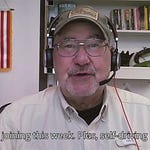As I turned away from his bed to leave, he reached out for me with both hands. The motion halted me. His nearer hand, below the ugly bruise surrounding the IV patch on his forearm, was strong, grasping for me. The other hand waved aimlessly, as though it knew it ought to offer support but lacked the strength to reach its mate.
A sudden constriction was in my throat. Did I ever look like this? I thought. Yes, and worse.
The next thought was a sudden revelation. Give him something. Give him something of yourself.
I turned back to face him. His eyes were intense, pleading.
* * * * *
It was my regular bi-weekly trip to the hospital’s seventh floor, north wing, where I had spent my entire summer two years ago. (At the date of this writing, it was EXACTLY two years ago: 22 June 2024 when I had been admitted.) During that time, I had been mostly confined to a bed like this one. In fact, it may have been the same room. Doesn’t matter.
(In the following, I have changed all the names except my own. Don’t try to figure them out.)
These days, a nurse who has become a life-long friend greets me on 7-North and suggests three or four patients I can see. The nurse, whom I will call Mandy, was one of the crew who had cared for me during my Acute Myeloid Leukemia treatments.
Mandy is scrupulous to obey HIPAA, that federal regulation keeping private medical matters private. She has never shared with me any of a patient’s sensitive medical information. However, she knows the people, and she knows me, and is in a unique position to help make my visits useful.
Happy talk, my favorite type of contact
On this day, following Mandy’s prompting, I called on Katara, who appeared to be sleeping. I entered her room quietly and accessed the wall-mounted waterless antiseptic cleaner pump for my hands. It was one of the requirements for volunteers, both on entering and leaving a patient room.
Not wishing to wake the lady, I was about to turn and leave when her eyes opened. She turned her head toward me.
“Hello,” she said pleasantly, and immediately pushed herself up in bed, plumping the pillows. She was ready for conversation.
I approached her. “My name is Curt,” I said, and offered my usual line: “I’m a volunteer. I come to spread joy and happiness in the cancer unit, and it is usually a tough sell.”
She laughed easily. “I bet so! It’s good of you to come by.”
I gestured to the empty cart at the side of her bed. “Have you had lunch yet?”
“No,” she said. “They’re late today.” She shrugged with a smile. “But it will show up eventually.”
A repeat visitor
She was perhaps 60 and told me she had suffered from a blood cancer for most of the last decade. In and out of hospitals and clinics; lots of routine chemotherapy.
“This time,” she added, “I’ve only been here since Tuesday. I’ll be here about a week, they tell me.”
I nodded. “Time enough for this round of chemo. And,” I smiled, “long enough to remember the menu choices.
She shrugged again. “It’s not bad. The food is always hot, usually on time, and I didn’t have to cook it.”
We talked about family, and the difficulty of being in-patient a hundred miles from home. Others felt compelled to visit her, but the chemo treatment was not difficult and she didn’t really need any help. Mostly, it was just boring.
“Boring is good, where cancer is concerned,” I told her.
I explained to her my own three-month battle in a bed like this one, and offered her a copy of Alligator Wrestling in the Cancer Ward. She was delighted with it.
“The message of the book,” I pointed out, “is this: If you lose the attitude war, you lose the war. But,” I added, “it looks like your attitude is holding steady.”
“So far,” she admitted. “But I’ll read the book! I’m very interested in how you dealt with this for such a long period.”
“For the man in your life,” I told her, “there is a war story in every chapter. If your husband is not sure he wants to read it, just tell him to skip to the last couple of pages of each chapter for the exciting part.”
* * * * *
And then, not so happy
I noted that one of the names Mandy had circled was Tork’s. I had seen Tork at least once before and had given him a copy of the book on an earlier visit. When I entered his room, he was awake. Barely.
Tork looked terrible. He was flat on his back, staring vacantly at the ceiling. The TV was on, sound muted, and he could not possibly see it from his angle. I approached his bed and saw recognition in his eyes.
“Hello Tork,” I said. “I’m Curt. I think we’ve met before.”
He nodded, and his voice was a low rasp. “Yes. You gave me a book.” His eyes wandered back to the ceiling tiles, unseeing, and spoke with an effort. “I haven’t read it.” His voice trailed off to nothing.
“I understand.” I gestured to the machines on the IV tree at his bedside. “I see they’ve got you hooked up and wired.”
Tork nodded, emaciated and exhausted. A large bandage was plastered to the inside of his right arm below the elbow, protecting an IV needle. A plastic tube carried fluid from an IV pump to the bandage. The arm was purple with bruising.
Tork was in bad shape.
We all take chemotherapy differently. Some tolerate it well. Others, like Tork, are almost destroyed by it: Nausea, aches, zero appetite, near-total exhaustion. For some, add urgent diarrhea to this mix and there is not much joy remaining.
“I’ll let you sleep,” I said. “Sleep is what will help you get better.”
That was when I turned to go, and saw his hands reach for me. A low, guttural sound escaped his throat. It was no more than a grunt, but I saw that it had taken an effort.
I turned back and offered my hand to him. He clutched it with surprising strength, using his near hand. His other hand wandered. Attempting to avoid the sight of the ugly, repulsive bruising on his arm, I caught his other hand, joined them together and let him hold me there.
There was a pause, the moment suddenly charged. Rarely does such intensity grip two men.
Prayer is not our last resort, but our first
“Tork, can I pray for you?” I asked.
He nodded and uttered something that may have been, “Please!”
I don’t recall what I said. It wasn’t long, but I suppose I asked God to strengthen Tork for this battle; to give him the energy to keep fighting; to ease the pain and suffering; to make him victorious in this fight.
That is not precisely the same thing as asking for the cancer to go away.
After I said, “Amen,” Tork relaxed his grip and let his arms drop. His eyes closed and he appeared to fall into an exhausted slumber.
I eased out of his room, a little shaken.
Theological Contemplations
I know that God can heal; I am proof of that. (So far. As Han Solo said, “Don’t get cocky, kid!”) But the ultimate healing for each of us will not come in this life. That is for later, and the timing is God’s alone.
It is enough for us to fight the battle to which we are called.
An old hymn uses this refrain:
Some through the waters, some through the flood,
Some through the fire, but all through the blood;
Some through great sorrow, but God gives a song,
In the night season and all the day long.
G. A. Young, God Leads Us Along, 1903
Tork’s battle is his own. It is entirely different from Katara’s, and from mine, and from yours.
If you lose the attitude war, you lose the war.
The New Testament writer adds clarity and perspective, in fairly bold terms:
19 And so, dear brothers and sisters, we can boldly enter heaven’s Most Holy Place because of the blood of Jesus. 20 By his death, Jesus opened a new and life-giving way through the curtain into the Most Holy Place.
Hebrews 10:19-20
Provide Alligator Wrestling books
Alligator Wrestling in the Cancer Ward: How a Christian Tough-Guy Survived Leukemia with Gallows Humor, One-Liners and a Praying Posse is my calling card during these visits. Several doctors have now supplied copies to place in their lobbies for free gifts to their patients.
One doctor explained to me why he was attracted to Alligator Wrestling in the Cancer Ward: “It’s the attitude. I use your book to challenge my patients to keep fighting. As soon as they quit fighting their cancer, they will wither away and die.”
If you know a physician who would be willing to make these books available, contact me and we’ll discuss how to make that happen. curt@alligatorpublishing.com
I will sign each book that is purchased for this purpose.
(As soon as Princess Kate is photographed with the copy I sent her, I’ll probably be on Good Morning America, and my signature in your book will be worth A LOT on eBay.)
Meanwhile, the books I hand out in the cancer ward are provided by readers like you. I keep a supply of them in a family room on 7-North with an information card that offers a signed copy for free. On every visit, I inventory the books and find that two or three have walked away during my absence. I pray they bring hope and comfort and peace.
If you are so led, visit the Via Christi Foundation website to purchase copies. Via Christi will direct the placement of your books with patients and caregivers. A $100 gift from you will purchase 5 books. That’s enough for one of my visits. Click the link below:
Thanks for following The Alligator Blog. Sometimes the posts here are more upbeat and entertaining. And sometimes we deal with real life. Which can be gritty.
Please share this post.















Share this post